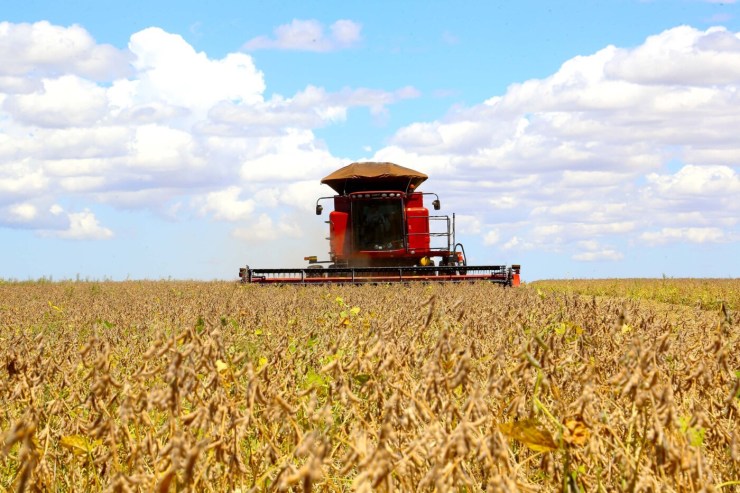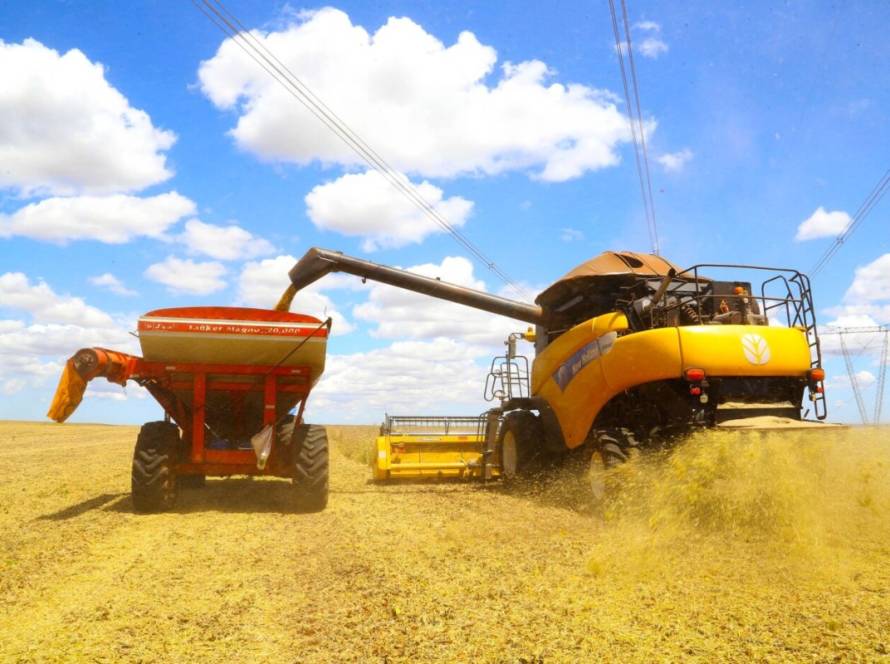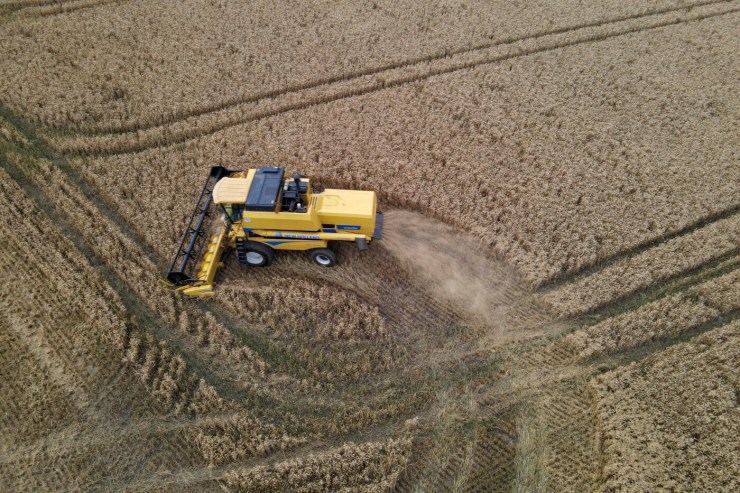During the Round Table “The challenges of climate change for the Cerrado Biome – Agriculture, livestock, forests and bioenergy”, moderated by researcher Eduardo Alano, deputy head of Research and Development at Embrapa Cerrados (DF), the influences of climate change on bioenergy, livestock, agriculture and forests in the Cerrado were discussed, considering the problems, perspectives and opportunities.

Professor at the Federal University of Goiás (UFG), Sybelle Barreira: “More than 70% of deforestation in Goiás and Mato Grosso are related to licensing. This, which was a huge challenge, is now a challenge that we can overcome”
Sybelle Barreira, a professor at the Federal University of Goiás (UFG), commented on the situation and the main challenges posed by climate change for the forestry sector in the Cerrado. She pointed out that illegal deforestation is a challenge that has been overcome with greater monitoring and control. “In 2024, Goiás, which has a large area of Cerrado, saw a reduction of more than 50% in deforestation. This is a victory for the state,” she said, citing data from the Annual Deforestation Report (RAD). “More than 70% of deforestation in Goiás and Mato Grosso is related to licensing. This, which was a very big challenge, is now a challenge that we can overcome,” she added, emphasizing that the Brazilian Forest Code cannot be ignored.
Barreira also highlighted the challenge of scientific research and communication to bring effective information to the reality of rural producers. “It is a challenge, but we have been overcoming it as an opportunity. We need public and proven investment to continue with research and rural extension,” he stated.
The deputy coordinator of Energy Transition at the National Electric Energy Agency (Aneel), Henrique Paiva de Paula, addressed the situation in the bioenergy sector. He explained that the energy transition is being discussed in light of climate change and must balance energy security, energy equity (payment capacity) and environmental sustainability. “Balancing these three pillars is challenging. In the current context of energy transition, especially globally, some pillars are starting to gain more weight, such as energy security, which may bring elements that make it difficult to maintain the other two pillars,” he noted.
Another challenge is to address the energy sector at the biome level, which can generate opportunities, according to de Paula. “When we talk about energy transition, we are always talking about addition. We are not replacing one fuel with another, or one energy vector with another. We are adding more from different energy vectors,” she said, noting that Brazil’s hydroelectric base has made a difference to the country and that, in the last 15 years, other energy sources have been introduced. “A challenge for the energy sector, when we talk about energy transition and climate change, is how to continue working on energy addition and energy transition at the same time. We need more energy and know what type of energy we want.”
For the consultant of the Mato Grosso Meat Institute (IMAC), Giovane Michelon, the main challenge for livestock farming in the face of climate change is the fact that the sector is treated as the biggest “villain” of illegal deforestation. “It is about overcoming (the issue), demonstrating and knowing how to ‘separate the wheat from the chaff’ of those who do wrong and those who do not, and not treating the rule as an exception”, he stated, pointing out the need to outline macro strategies such as the image of Mato Grosso meat (in the case of IMAC), the intensification of production and reduction of carbon in the livestock chain, the advancement of the environmental regularization agenda, as well as transparency and traceability of the entire chain.
“The biggest challenge is to remove the taint from the cattle rancher as the main deforester, as an environmental enemy. And in reality, that is not the case, quite the opposite. Today, the greatest controls are precisely those of the cattle ranchers,” he commented, highlighting the importance of closer ties between institutions and producers and showing that these challenges can be overcome.
Leny Rosa Filho, federal superintendent of Agriculture and Livestock for the State of Mato Grosso (Mapa), pointed out the politicization of the environmental agenda as one of the main challenges for agriculture in the context of climate change. “Federal, state and municipal governments have a responsibility. All practices promoted by Mapa take into account scientific knowledge and respect for the environment. However, some environmental laws in the states are approved without taking these issues into consideration. Everyone has to speak the same language, always valuing scientific knowledge,” she said.
The superintendent also pointed out the reduction of inequalities in the countryside as a major challenge. He mentioned some actions undertaken by the Federal Superintendence of Agriculture and Livestock in the state, such as the implementation of the Embrapa Mixed Research and Innovation Unit (Umipi) in Baixada Cuiabana and the Solo Vivo Program, aimed at recovering degraded areas on family farms.
Opportunities
For Giovane Michelon, opportunities for livestock farming are being created as public policies become less efficient. He mentioned the Reinsertion and Monitoring Program (Prem), created by IMAC to reinsert livestock farmers blocked by industries into the market, through a tool that helps monitor the regeneration of illegally deforested areas in the state for environmental regularization purposes.
“We ended up creating and advancing the environmental recovery process through Prem, which monitors the system, but we bring the producer back to the market, and they now have a marketing authorization. And from there, we can check whether they are really recovering the area that was illegally deforested,” he explained. Prem gave rise to the Green Passport, a public policy supported by the Federal Public Prosecutor's Office that helps with environmental regularization in Mato Grosso. “Through this policy, we will be able to work with the intensification process, seek to reduce carbon in production and achieve traceability.”

Deputy Coordinator of Energy Transition at the National Electric Energy Agency (Aneel), Henrique Paiva de Paula: “Balancing these three pillars is challenging. In the current context of energy transition, especially globally, some pillars are starting to gain more weight, such as energy security, which can bring elements that make it difficult to maintain the other two pillars.”
Henrique de Paula reported that Aneel has created working groups to participate in the development of public policies such as the Climate Plan, the Brazilian Sustainable Taxonomy, the National Energy Transition Plan and the New Industry Brazil, which affect bioenergy and various segments of the energy sector. Regulatory activities have also been undertaken, such as the regulation of energy storage systems, such as reversible hydroelectric plants. “Traditionally, the Cerrado has a large part of Brazil’s small hydroelectric plants, for example. Does it make sense to look at each biome and seek opportunities for this type of regulatory activity? This is a reflection that I will take to the Agency,” he said.
Another opportunity envisioned by Aneel's deputy coordinator of Energy Transition is in the Research, Development and Innovation Program, which defined seven strategic themes – among them, low-carbon electricity and electrification of the economy, which involve bioenergy.
Raising awareness among young people about the importance of both agriculture and environmental preservation should be a topic to be discussed at COP30, according to Leny Rosa Filho. He reported that the Ministry of Agriculture is restructuring the National Institute of Meteorology (Inmet), improving and modernizing meteorological stations in order to provide more accurate meteorological data to producers.
Sybelle Barreira stressed the need for educational and research institutions to relearn how to communicate science to young people. “This is not easy,” she stressed. The UFG professor cited problems in the forestry sector resulting from rising temperatures, such as loss of habitat for flora and fauna, the need to remodel flora and fauna to adapt to new conditions, high mortality rates of plant species that have compromised natural regeneration, a drop in eucalyptus productivity, loss of seasonal rainfall patterns, and increased emissions of nitrous oxide into the atmosphere.
In this sense, she pointed out some strategies. “The ABC+ Plan is an excellent strategy, especially for integrated systems and monoculture (eucalyptus) plantations. But we will need clones adapted to this increase in temperature. I request that the data from the ABC Plan and the ABC+ Plan be released so that we can know where these integrated systems and monoculture plantations were implemented,” she said, arguing that the information could help advance research. Barreira also suggested the creation of state programs that aim for zero illegal deforestation and defended the investment of public and private resources in small research groups in the forestry area.
Role of science
Henrique de Paula pointed out the challenge of adequately communicating public policy and science when both converge, both to the general public and internally within institutions, citing the preparation of a practical guide on climate change and energy transition for Aneel technicians, as well as the collection of public impressions about the publication. He highlighted the role of research, development and innovation not only for the production of data but also for the advancement of technologies that contribute to the energy transition, citing that the first Brazilian wind generator originated from research projects in a public call by Aneel, and that a call for projects aimed at the production of low-carbon hydrogen through bioenergy is under discussion.
For Leny Rosa Filho, it is necessary to harmonize the discourse on climate change in the scientific community, based on science and scientific knowledge. “Perhaps we should strengthen the role of science, improve the narrative and generate data to combat the claims that climate change is not causing some of the situations we experience on a daily basis,” she commented.
Generating information is a major challenge for science, according to Sybelle Barreira. “With challenges, we generate opportunities for scientific and technological development. This is the main focus we need to work on. It’s not just about funding,” she said, highlighting the importance of forming research networks, as well as open data networks. “Science can greatly contribute to this dialogue, to help us advance in terms of mitigating and adapting to climate change. But we need to know who does what,” she added.
Giovane Michelon stressed that public policies must be based on scientific research. “A public policy made simply based on socioeconomic data, but without scientific data, ends up being empty,” he commented. He stressed that public policy is not a recipe. “When we talk about recovery or regeneration, we cannot apply the same logic that we used in the Amazon to the Cerrado or the Pantanal. These are different logics that must be based on scientific means. Today, we have to understand that some logics have changed. And what we used to apply may no longer work, precisely because of climate change,” he argued.
At the end of the Round Table, participants answered questions from the audience about pest and disease management in the face of climate change; economic return on investments in sustainability and recognition of producers who adopt sustainable practices; and the forestry component in meat production and its incorporation into family farming.





